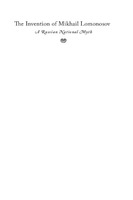The Invention of Mikhail Lomonosov
A Russian National Myth
| dc.contributor.author | Usitalo, Steven | |
| dc.date.accessioned | 2018-01-06 23:55 | |
| dc.date.accessioned | 2017-12-01 23:55:55 | |
| dc.date.accessioned | 2020-03-27 03:00:26 | |
| dc.date.accessioned | 2020-04-01T13:17:15Z | |
| dc.date.available | 2020-04-01T13:17:15Z | |
| dc.date.issued | 2013-08-01 | |
| dc.identifier | 641444 | |
| dc.identifier | OCN: 861693428 | en_US |
| dc.identifier.uri | http://library.oapen.org/handle/20.500.12657/30897 | |
| dc.description.abstract | For more than two hundred years, the eighteenth-century polymath Mikhail Vasil’evich Lomonosov (1711–1765) has been glorified in Russian culture as the “father” of Russian science, literature, and, more generally, learning. This study traces the evolution of Lomonosov’s imposing stature in Russian thought from the middle of the eighteenth century to the closing years of the Soviet period. It reveals much about the attitudes toward the meaning and significance of science in Russian culture, as well as about the rise of a Russian national identity, of which Lomonosov became an outstanding symbol. Steven Usitalo argues that Lomonosov’s fame has surpassed any realistic association with the known details of his life; he is of interest primarily as a symbolic figure who fulfilled the tangible intellectual and emotional requirements that Russian pride demanded in a national myth. | |
| dc.language | English | |
| dc.relation.ispartofseries | Imperial Encounters in Russian History | |
| dc.subject.other | History | |
| dc.subject.other | History | |
| dc.subject.other | Alexander Pushkin | |
| dc.subject.other | Alexander Radishchev | |
| dc.subject.other | Isaac Newton | |
| dc.subject.other | Leonhard Euler | |
| dc.subject.other | Mikhail Lomonosov | |
| dc.subject.other | Russia | |
| dc.subject.other | Russian Academy of Sciences | |
| dc.subject.other | Russians | |
| dc.subject.other | Saint Petersburg | |
| dc.title | The Invention of Mikhail Lomonosov | |
| dc.title.alternative | A Russian National Myth | |
| dc.type | book | |
| oapen.identifier.doi | 10.2307/j.ctt1zxsj87 | |
| oapen.relation.isPublishedBy | ffe92610-fbe7-449b-a2a8-02c411701a23 | |
| oapen.relation.isFundedBy | b818ba9d-2dd9-4fd7-a364-7f305aef7ee9 | |
| oapen.relation.isbn | 9781618116727 | |
| oapen.collection | Knowledge Unlatched (KU) | |
| oapen.place.publication | Boston, MA | |
| oapen.grant.number | 101798 | |
| oapen.grant.program | KU Open Services | |
| oapen.remark.public | Relevant Wikipedia pages: Alexander Pushkin - https://en.wikipedia.org/wiki/Alexander_Pushkin; Alexander Radishchev - https://en.wikipedia.org/wiki/Alexander_Radishchev; Isaac Newton - https://en.wikipedia.org/wiki/Isaac_Newton; Leonhard Euler - https://en.wikipedia.org/wiki/Leonhard_Euler; Mikhail Lomonosov - https://en.wikipedia.org/wiki/Mikhail_Lomonosov; Russia - https://en.wikipedia.org/wiki/Russia; Russian Academy of Sciences - https://en.wikipedia.org/wiki/Russian_Academy_of_Sciences; Russians - https://en.wikipedia.org/wiki/Russians; Saint Petersburg - https://en.wikipedia.org/wiki/Saint_Petersburg | |
| oapen.identifier.isbn | 9781618116727 | |
| grantor.number | 101798 |

